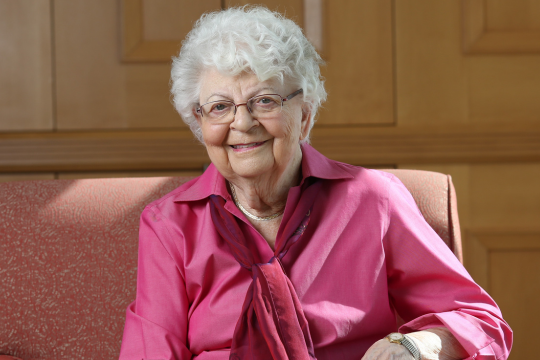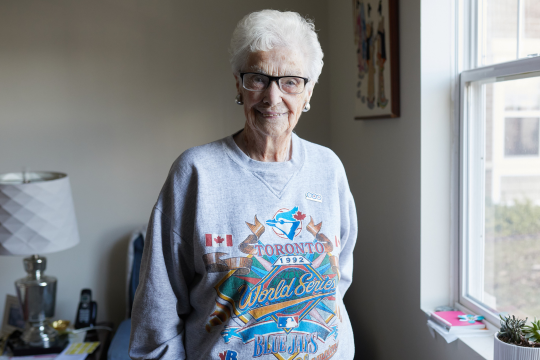
Esther Louch turned 100 in April and only just moved into a retirement home. She spent her career working for the board of education while her late husband worked for the federal public service. She has volunteered for Federal Retirees, still travels and loves to read. Photo: Dave Chan
Esther Louch celebrated her 100th birthday April 20, surrounded by family at a cosy Gatineau, Qué., restaurant called l’Orée du Bois. She plays bridge regularly at the retirement home she moved into a few months earlier and she tries to go for a walk every day.
Centenarian Louch is part of a new trend. Canada’s population is rapidly aging, and many more of us are living to 100. One in five Canadians is now over the age of 65. In the coming years, more of us will see that second century as that large Boomer cohort ages.
In 2022, Statistics Canada data showed the country is home to nearly 13,500 centenarians, a 43 per cent increase over 2018. Over the next 25 years, StatsCan predicts our population aged 85 and older could triple to almost 2.5 million people. More than half will be women, who tend to live longer.
Despite a small drop in life expectancy over the pandemic, when the average went from 82.3 to 81.3 years, that health emergency now appears to be over. Canada lost nearly 59,000 people to COVID-19, which skewed down the country’s national life expectancy data. But overall, since the dawn of the 20th century, we’ve been living longer and longer, mostly because of the drop in child mortality due to economic growth, improved nutrition, new sanitary measures and advances in knowledge about infant care.
People in the year 1900 lived to the average age of 45, then in 1960 to 71, then to 75 in 1980 and 79 in 2000.
So what’s the secret to being in that lucky group who see a second century? Many scientists are trying to figure that out, but nobody is entirely sure.
“Boston has a large centenarian longitudinal study,” says Andrew Costa, associate scientific director of the Canadian Longitudinal Study on Aging (CSLA) and Schlegel Research Chair in Clinical Epidemiology & Aging and an associate professor in the Department of Medicine at McMaster University. “And there’s some thought that there’s some gut biomes. But it’s very hard to know whether those gut biomes aren’t just the accumulation of good lifestyle all along.”
Costa explains that the reason people live into their 80s is between 30 and 40 per cent genetic.

Burdett Sisler, 108, has never smoked. His doctor says he has a 16-year-old’s lungs. Photo: Bob Tymczyszyn/Torstar
“The vast, vast majority is lifestyle,” he says. “Did you smoke? Did you [have] high risk behaviours? What was your diet like?”
Burdett T. Sisler, 108, concurs, partially crediting his longevity to never having smoked. His doctor tells him he has the lungs of a 16-year-old.
“Keep an open mind,” advises the Second World War secret service member and Canada Customs retiree. “There’s no sense in being unpleasant to anybody.”
Successful aging
The commonality to all centenarians is that they succeeded in what is termed “successful aging.” That’s defined as: no limitations in activities of daily living, regardless of chronic illnesses; freedom from any serious mental illness, memory problems and disabling chronic pain; adequate social support and self-reported happiness; and a subjective perception of their physical and mental health and their aging process as good.
“They’re generally happy people,” Costa says. “And you expect that to be the case. But there doesn’t seem to be a wonderful explanation for those individuals as to how they made it to beyond 100,” Costa adds. “When we collect their blood, when we look at their values, they’re all over the place.”
Jeanne Calment, French supercentenarian and verified as the oldest human, lived to 122 years and 164 days, and was a daily smoker. Somehow, she escaped lung disease and cancer. Current science theorizes Calment reached about the maximum a human can live, at least until someone next shatters that record.
“I’m a sports fan,” says Agnes Ward, who served overseas with the Royal Canadian Air Force in the Second World War before spending 30 years with the Department of National Defence (DND) and retiring in the early 1980s in Trenton, Ont. She only moved last year, at 101, into a retirement home — she specifies that it’s not a nursing home — and was angry when even with a clean driving record they took away her licence at 97.
“I love my Blue Jays,” she says enthusiastically. “Once baseball starts don’t look for me in the daytime. And I enjoy hockey. I keep watching the Leafs. But baseball is my favourite. I just love the Blue Jays. I can hardly wait for the season to start.”
The CLSA’s latest 2022 study on aging looked at 30,097 Canadian men and women aged 45 and 85 years. Of those, more than 7,600 respondents were defined as “aging successfully.”
John W. (Bill) Thorsteinson is 101, also a veteran of the Second World War and shares an apartment with a friend in White Rock, B.C. He retired from Canada Customs in 1978, and he’s been healthy his entire life and is still driving today. But only to get groceries in low traffic times in the morning. His three-year-old SUV only has 1,500 kilometres on the odometer.
“Every day seems to be a pleasant day,” says Thorsteinson, who, like many centenarians, now walks with a cane for balance support. “I get surrounded by family and I do a lot of reading because I’m somehow limited in terms of walking.”
According to CLSA’s studies, immigrants have a lower prevalence of successful aging than their Canadian-born peers. The thought is that those who lived their lives in Canada mostly experienced clean water, good sanitation and a decent environment.
Immigrants are “coming in with different histories of being in different environments with different lifestyle factors. And that might change the way they age in our society,” Costa says. “We might see an exaggeration of differences in terms of diseases people get when they age, depending on some of the early factors of their life where you are living. We don’t know.”
We do have ideas why women live longer though, besides their two X chromosomes and lower testosterone. Testosterone makes men stronger in youth, but often causes heart problems in later years.
“You have this huge phenomenon where women live longer,” Costa says, noting male longevity is catching up. “We know that men traditionally did more dangerous work, had some much more deleterious sort of lifestyle factors like smoking.”

Agnes Ward, who served with the Royal Canadian Air Force in the Second World War before spending 30 years with the Department of National Defence, moved into a retirement home at the age of 101. A lifelong Blue Jays fan, she was going to her first game ever this spring, on the Jays’ invite. Photo: Jackie Hall Photography
The study found that respondents had higher odds of successful aging if they were: continuously married or newly married versus never married; and engaging in positive social interactions like volunteer or charity work and recreational activities versus not engaging in such activities.
But there are always exceptions. Trenton’s Agnes Ward never married, and though she says she was lucky to have escaped a couple of failed engagements, and had a travelling companion for 17 years, she has certainly aged successfully.
“When God is willing to take me, I’ll go,” she says. “But in the meantime, he’s given me a wonderful life. And I take each day as it comes. And I enjoy every day.”

